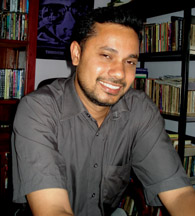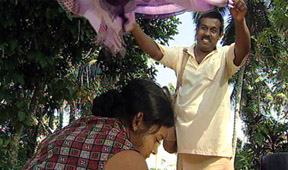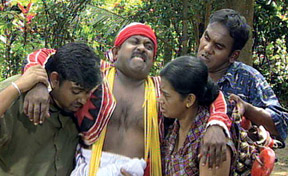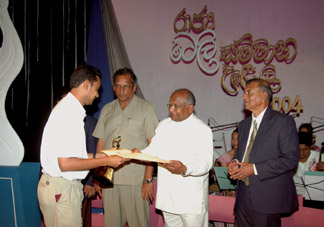|
observer |
|
|
|
|
|
OTHER LINKS |

|

|

|
A path-definer of the new eraHe contributes to the progressive cause with
value-based works of Art
With a slim figure, the young actor, television director Ranga Bandaranayake seems to be quite an ordinary television producer who works for Sri Lanka Rupavahini Corporation (SLRC) and also seems to be contended with his chosen profession. Ranga sports a character of a very calm and settled young man though he is not very much religious as he himself admits. However, as I started to carry on a candid conversation with him, I discovered a totally different person with a critical view on the application of contemporary Sri Lankan Arts and Culture and the direction in which it is set out. Among other things, he critically assesses the ethos, objectives and the curtailments of artistic freedom in Sri Lanka, especially at a time when radical Islamic regimes such as Iran is opening up its culture to the outer world. Fiercely independent, Ranga had never liked to be told what is to be done. His famous father, veteran dramatist and film director, Dharmasiri Bandaranayake has had a profound influence on the shaping of Ranga's character at a formative stage of his life as it invariably coincided with his entry into the medium of film at the age of seven when he acted for a film directed by Dharmasiri Bandaranayake. Ranga acted for his second film at the age of nine. Following the footsteps of his father, Ranga joined the field as an Assistant Producer of the SLRC where he currently works. As he believes in hard work and updating himself with new arrivals and knowledge in the field, he has also chosen the sturdy way to walk along the beaten track and proved his metal by securing the award for the best director in single-episode teledrama at the State Tele Awards for one of his creations, Sitha Nivana Katha.
Reminiscing vibrantly of his early school days which actually laid the foundation for an excellent actor in Ranga, he admits that he was introduced to the theatre at St.John's College Panadura and subsequentltly at Kalutara Vidyalaya and D.S Senanayake College where young Ranga acted , for the first time, on stage. In addition, Ranga also acted in plays produced at Sunday Dhamma school prior to his debut on the Silver screen in 'Hansa Vilak' in 1980, at the age of seven. He also acted in 'Thunweniyamaya' in 1982. His entry into theatre marked with 'Ekadipathi'. This was significant on two counts; for his long standing love affair with the stage and a decision to make a career in theatre. While he was studying for the Ordinary Level Examination, Ranga joined 'Dhavalabheeshana' as a stage manager. Afterwards he acted in 'Yakshagamanaya' and later stage managed the play. From the stage, Ranga stepped into the yet unknown area of art, at the time, with Sudath Mahadivulwewa's teledrama 'Dande Leu Gini' marking his debut in the small screen and also acted in the film Chitty directed by Sarath Gunaratne. Soon, he became a much sought-after actor in the small screen and played the lead role in Sunil Chandasiri's play 'Gini Dandu Hevana' in 1997. Ranga Bandaranayake is proud of being associated with 'Trojan women', a monumental production in Sinhala theatre in the capacity of an assistant director and also managing the sounds and stage for the play as well as his contribution to the teledrama 'Sudu Kapuru Pethi'. When it comes to awards and accolades that Ranga won on numerous occasions for his outstanding performance on the stage as an actor and behind it as an assistant director and stage and sound manager, he maintains a rather lukewarm attitude attributing many of the awards that he won for 'Trojan Women' to his father's credit (including the award for the best stage manager of the year). Commenting on his impressions on his father, Ranga's feelings towards him were awe-inspiring at the start as he saw his father's image on newspapers and TV and later it develops into an admiration. As he grew up, Ranga started to work with him (Dharmasiri Bandaranayake) and to educate himself by observing his father at work. However, Ranga admits that working with his father was not always smooth as anyone might think. At times he admonished Ranga, especially when they were working in 'Hansa Vilak' and 'Thunveniyamaya'. He was severely reprimanded as he worked in 'Ekadipathi'. The relationship between father and son gradually evolved into a kind of friendship following Bhawaduka. With a witty smile, Ranga recalls how actress Meena Kumari crossed path leading to their happy marriage. It was a divine prospect for Ranga when he was asked to speak to Meena on behalf of Sunil Chandrasiri who was eager to get Meena to act for his stage play , Gini Dandu Hevana, a translation of an Irish play , Shadow of a Gunman . Soon, Ranga took up the trouble of accompanying Meena home after rehearsals. Intimate conversations and long-bus rides culminated in their happy marriage and now Ranga is the father of a daughter. As a father, Ranga is of the view that he will assist their daughter to persue a career she chooses. Shortlisted, in 2004, in the Sumathi Tele-Awards for best direction of a single episode tele-drama, the State Tele award for the tele-drama Sitha Nivana Katha, a special poya programme produced by Rupavahini are some of the achievements in his career. He also directed 33,000 Volts and Theatra (Theatre Magazine Programme ) and also hoped to work on a teledrama based on Prof. Nimal Senanayake's translation of Dostoevsky's Crime and Punishment. One of Ranga's cherished dreams is to enter the field of cinema as a director. Ranga evokes how his father used to show classical Soviet and Czechoslovakian black and white films on a screen erected in the front yard with a 16 mm projector. Making observations on various forms of curtailments of artistic freedom, Ranga is of the opinion that an artist is essentially a free thinker who is entitled to his views, political, religious or otherwise and should be allowed to be free to articulate his or her ideology since an artist will never impose his or her ideas or views on the public. Accordingly, freedom for an artist is similar to the right to life in a democracy and it is, undoubtedly, within this freedom that creativity and thinking flourishes. It is his conviction that there is no association with art and morale, a fact that had been restated and patently squabbled by the Russian literary giant, Leo Tolstoy. The superseding discourse demands more and more works of art embodying ideals and beliefs of the protection of a non-existing puritan culture and unmoved religion or even a particular race. However, it is controversial that art which is a medium of expressing the innermost feelings and emotions of the human mind should be used to protect or propagate the dominant dialogue which is more or less the end result of the collective effort of the political, cultural and religious leaders of the country at a particular period of time. Ranga stands for discovering his own identity in art which is not necessary to be in conformity with the popular trend and their commercialised applications. In the popular trend focus is on exploiting markets and to gain a competitive advantage over other works of art and not to explore the complex human nature or convey a profound personal experience to the audience. The prime motive of those works of art or imposters of medium is money and therefore tends to lure more armature, adventurous new entrants to the fields to earn quick money often at the expense of the media and in the long run, their talents. Leo Tolstoy, Dostoyesvesky, Akira Kurasawa, Satyajith Ray, Bergmann, Ernest Hemingway, Bertolt Brecht, William Shakespeare, Henrick Ibson etc. belong to the genre of artists and writers who strived to define their own paths in their media of Art and thereby truly identified themselves with their countries and their cultures. Subsequently they became part and parcel of the collective identity of their particular countries becoming cultural icons with which those countries are being identified. Redolent of the happy moments spent with the artists and the interactive discussions, he maintains that Dharmasena Pathiraja,Prof.Sucharitha Gamlath , Sugathapala de Silva etc. are the people's artists with Marxist-orientation who always served the progressive cause and moulds his philosophy of life besides his parents. It is an extreme folly if someone believes in imposing a criteria on Fine Arts and demands the artists to comply with certain features; they are similar to tyrants since this will severely curtail the creativity of the artist contributing to the degradation of the Fine Arts which is evident in the contribution made in the latter part of the life of Maxim Gorky. This also leads to a conflict of duty versus personal freedom. Only better ideas, not better rules and regulations can alter a society because it is the ideas and not power that rules the society. There has been a general decline in ideology with pragmatism jettisoning the principles. History bears ample testimony that cupidity has only short-term gains and in the long run, is self-defeating. According to the old adage "those who forget history are condemned to repeat it." Needless to say, the values are the ones which include the total preoccupation of a society with the wellbeing of the people, a general code of conduct and protocol for its members and a sentinel belief of 'vox populi and vox Dei'. A healthy atmosphere does not only construct a true society but also influence the alien societies by setting ideals. The right kind of creations surely appeals to the pulse of the nation. Value-based works of Art defines a millieu and reflects the quality of public life and the general taste of a nation. It is basically philanthropic in nature. This beyond doubt increases productivity and improves social conscience. Honest values prove the elixir of ideas and lend credibility to it. A value-based creation is the impelling power for the progressive cause, sagely advising, rejecting extreme ideological temptation. Also, its representatives have no conceptual confusion or ambiguity about loyalty, duty, honour, patriotism, sacrifice, self-respect and dignity. It may seem a pipe-dream but a committed adherence to these personas will give them confidence to tell the policy makers what they may not always like to hear. This will bring hope for the future and embedded self-respect, discipline and a gentle attitude in the minds of the people who are the sole constituents of the social infrastructure and raise the status of the nation in the world community at large. |











